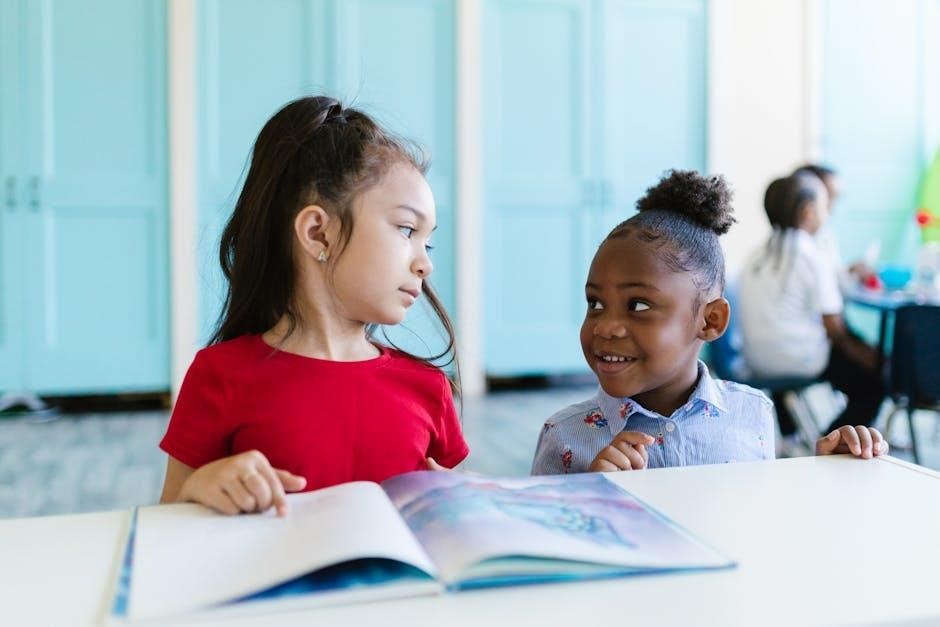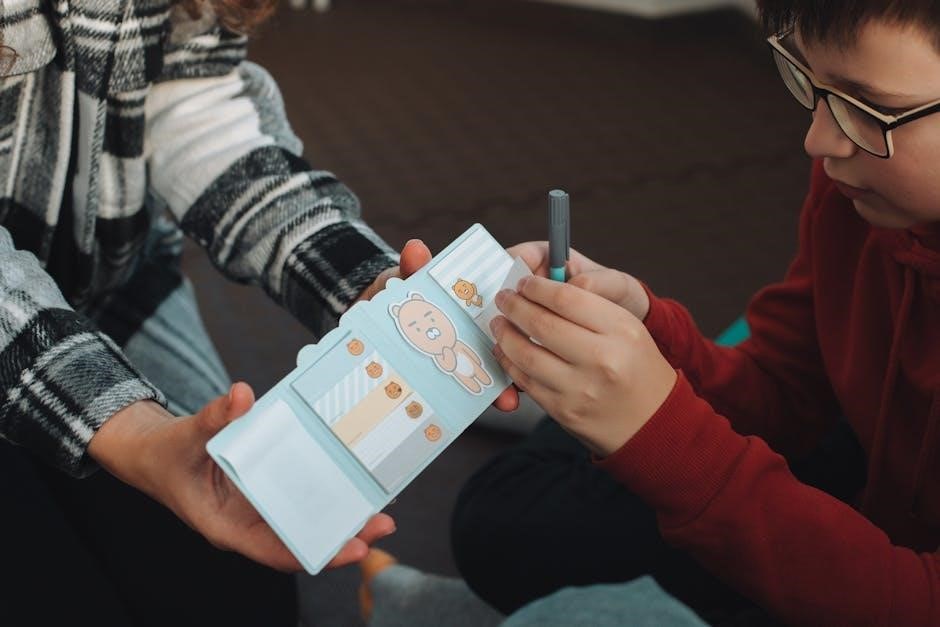Kindergarten reading worksheets are essential tools for developing early literacy skills in young learners. These resources, often available as free PDF downloads, provide engaging activities like sight word recognition, CVC word exercises, and simple comprehension exercises. Designed for beginners, they help children build foundational reading abilities through fun and interactive tasks, making learning enjoyable and effective.
1.1 Importance of Early Reading Skills
Developing early reading skills is crucial for young learners, as it forms the foundation for future academic success. These skills enhance vocabulary, comprehension, and the ability to interpret texts. Early reading fosters a love for learning, builds confidence, and improves cognitive development. Introducing reading at the kindergarten level ensures children are better prepared for complex tasks in later grades. It also strengthens their ability to express ideas and understand the world around them, laying the groundwork for lifelong learning and personal growth.
1.2 Benefits of Using Worksheets for Kindergarteners
Kindergarten reading worksheets provide a structured approach to learning, helping children develop foundational skills like alphabet recognition, sight words, and basic comprehension. These tools are designed to be engaging, with colorful illustrations and interactive elements that keep young learners focused. Worksheets also offer a sense of accomplishment as children complete tasks, boosting confidence. Additionally, they are easily accessible as free PDF downloads, making them a convenient resource for parents and teachers to foster early literacy and a lifelong love for reading.

Types of Kindergarten Reading Worksheets
Common types include alphabet tracing, phonics, and sight word recognition, CVC word exercises, and reading comprehension, all available as free PDF downloads.
2.1 Alphabet and Phonics Worksheets
Alphabet and phonics worksheets are fundamental for early reading development. These free PDF resources include letter tracing, sound recognition, and blending activities. They help kindergarteners identify letters, understand phonemes, and develop decoding skills. Interactive exercises, such as matching letters to sounds and filling in missing letters, make learning engaging; Available in downloadable formats, these worksheets are perfect for parents and teachers to support young learners in building a strong reading foundation.
2.2 Sight Word Recognition Sheets
Sight word recognition sheets are crucial for early reading fluency. These free PDF worksheets focus on high-frequency words that young readers encounter often. Activities include tracing, matching, and identifying sight words within sentences. Engaging exercises like “color by sight word” make learning fun. Designed for kindergarteners, these sheets help build confidence and speed in reading. They are easily downloadable and provide a structured way to master essential vocabulary, supporting early literacy development effectively.
2.3 Reading Comprehension Exercises
Reading comprehension exercises are vital for developing understanding skills in young readers. These worksheets feature short, engaging passages followed by simple questions to check comprehension. Activities include identifying the main character, sequencing events, and finding descriptive words. Designed for kindergarteners, these exercises use common sight words and CVC words to build confidence. Interactive elements like true/false questions and word banks make learning fun and effective, helping children grasp the meaning of texts and develop early reading fluency.
2.4 CVC Word Activities
CVC (Consonant-Vowel-Consonant) word activities are foundational for early readers, focusing on simple, three-letter words. Worksheets include tracing, matching, and writing tasks to build phonics skills. Engaging exercises like word families and rhyming games help children decode words confidently. These activities, often included in free PDF downloads, provide hands-on practice, reinforcing the connection between sounds and letters. Interactive elements like color-by-word and word-building puzzles make learning enjoyable and effective for young learners.

Skills and Concepts Covered
Kindergarten reading worksheets focus on building foundational skills like vocabulary, sentence structure, word families, and rhyming. They also enhance fine motor skills through tracing and writing exercises, ensuring well-rounded development.
3.1 Basic Vocabulary Building
Kindergarten reading worksheets play a crucial role in vocabulary building by introducing simple, age-appropriate words. Through engaging exercises like matching games, word searches, and short stories, children learn to recognize and understand basic words. These activities are designed to be fun and interactive, making the process of learning new words enjoyable and effective. By incorporating free PDF worksheets, parents and teachers can easily provide young learners with the tools they need to expand their vocabulary and improve their reading skills. This foundation is essential for future academic success.
3.2 Sentence Structure and Grammar
Kindergarten reading worksheets help children understand sentence structure and basic grammar through simple, engaging exercises. Activities like sequencing events, identifying parts of sentences, and completing sentences with correct words aid in developing foundational grammar skills. These worksheets often include short stories and exercises that introduce children to sentence patterns, helping them recognize and reproduce grammatically correct sentences. By practicing with these resources, young learners build a strong foundation for reading and writing, essential for future academic success.
3.3 Word Families and Rhyming
Kindergarten reading worksheets often include activities focused on word families and rhyming to enhance phonological awareness. These exercises help children recognize patterns in words, such as “cat,” “hat,” and “mat,” and identify rhyming sounds. Worksheets may feature matching games, fill-in-the-blank tasks, and sorting activities. By practicing these skills, young learners develop an understanding of word relationships, which is crucial for decoding and reading fluency. These activities make learning engaging and fun, fostering a strong foundation in early literacy.
3.4 Fine Motor Skills Through Tracing
Tracing activities in kindergarten reading worksheets help develop fine motor skills, essential for writing and handwriting. These exercises often involve tracing letters, words, or simple shapes, improving dexterity and hand-eye coordination. Many free PDF worksheets include tracing games that make learning fun. By mastering these skills, children gain confidence and readiness for more complex writing tasks, laying a strong foundation for their academic journey.

Design and Layout of Worksheets
Kindergarten reading worksheets are designed with colorful visuals and large fonts to engage young learners. Interactive elements like tracing and matching games make learning fun and effective for early readers.
4.1 Colorful and Engaging Illustrations
Kindergarten reading worksheets often feature colorful and engaging illustrations to capture young learners’ attention. These vibrant visuals help children connect with the content, making abstract concepts more relatable. Illustrations are carefully designed to complement stories and exercises, enhancing comprehension and motivation. Many free PDF worksheets include fun characters and scenes, creating an enjoyable learning environment; These engaging images not only make reading activities more appealing but also help kindergarteners stay focused and excited about learning new skills.
4.2 Large, Clear Font for Easy Reading
Kindergarten reading worksheets feature large, clear fonts to ensure easy readability for young learners. The oversized text helps children focus on letter recognition and word formation without strain. Bold and distinct fonts are often used to emphasize key words or phrases, making it simpler for kindergarteners to follow along. This design element is crucial for building confidence and familiarity with written language, providing a comfortable and accessible learning experience for early readers;
4.3 Interactive Elements for Fun Learning
Kindergarten reading worksheets often include interactive elements to make learning engaging and enjoyable. Features like color-by-sight-word activities, matching games, and traceable letters encourage hands-on participation. Many worksheets incorporate simple exercises that allow children to interact with the content, such as circling words or drawing pictures. These elements cater to different learning styles, making reading practice a fun and dynamic experience for young students while reinforcing foundational skills in an entertaining way.

Popular Resources for Free Worksheets
Websites like Teachers Pay Teachers and ABCmouse offer a wide variety of free kindergarten reading worksheets in PDF format, providing easy access to educational resources for young learners.
5.1 Websites Offering Free PDF Downloads
Websites like Teachers Pay Teachers and ABCmouse provide an extensive collection of free kindergarten reading worksheets in PDF format. These platforms offer downloadable resources such as sight word exercises, CVC word activities, and reading comprehension passages. They cater to various learning needs, ensuring engaging and interactive experiences for young learners. Parents and educators can easily access these materials, making it convenient to support early literacy development at home or in the classroom.
5.2 Printable Worksheets from Educational Platforms
Educational platforms like ABCmouse, Education;com, and Reading A-Z offer a wide range of free printable kindergarten reading worksheets. These platforms provide PDF formats of phonics exercises, sight word activities, and reading comprehension passages. They cater to diverse learning needs, ensuring engaging and interactive experiences. Parents and teachers can easily print these resources, making them ideal for home or classroom use. Many platforms also include answer keys and progress-tracking features to support effective learning and assessment.
5.3 Teacher-Recommended Worksheet Collections
Teachers often recommend worksheet collections from trusted educational communities like Teachers Pay Teachers and Educents. These platforms offer curated sets of free kindergarten reading worksheets in PDF format, designed by experienced educators. Collections typically include phonics, sight word practice, and comprehension exercises. They are often aligned with curriculum standards and provide engaging, skill-specific activities. These resources are popular among teachers for their ease of use and effectiveness in supporting young learners’ reading development.

How to Use Worksheets Effectively
Encourage a daily routine with free PDF worksheets, integrating them into lesson plans for structured learning. Use interactive elements and fun activities to keep children engaged and excited.
6.1 Creating a Daily Reading Routine
Establishing a consistent reading routine is crucial for young learners. Begin each day with a short session using free PDF worksheets to introduce new skills like alphabet tracing or sight words. Incorporate stories and comprehension exercises to foster a love for reading. Make it fun by alternating between activity types, such as coloring by sight words or matching CVC words, to keep children engaged and eager to learn every day.
6.2 Incorporating Worksheets into Lesson Plans
Incorporate kindergarten reading worksheets into daily lesson plans to reinforce learning objectives. Start with phonics exercises, followed by sight word practice, and conclude with reading comprehension passages. Use these free PDF resources to create structured activities that align with your curriculum. For example, pair CVC word worksheets with interactive games or group reading sessions. This integration ensures a balanced approach to teaching reading skills while keeping lessons engaging and productive for young learners.
6.3 Making Learning Interactive and Fun
Transform learning into an engaging experience with interactive kindergarten reading worksheets. Use color-by-sight-word activities, CVC word games, and rhyming exercises to captivate young learners. Incorporate digital tools, such as online worksheets with immediate feedback, to make practice exciting. Pair reading tasks with hands-on activities like word matching or storytelling to encourage active participation. These free PDF resources help create dynamic lessons that keep children motivated and eager to learn, fostering a love for reading from an early age.

Assessing Progress with Worksheets
Use free kindergarten reading worksheets PDF with answer keys to track progress. Identify areas needing practice through comprehension questions and CVC exercises, ensuring accurate skill development in young learners.
7.1 Tracking Improvement in Reading Skills
Regularly reviewing kindergarten reading worksheets PDF helps track progress. Teachers and parents can monitor improvements in phonics, sight words, and comprehension. Free PDFs often include answer keys, making it easy to assess accuracy and identify areas for further practice. By consistently using these tools, educators can ensure young learners build a strong foundation in reading, fostering confidence and fluency as they progress.
7.2 Using Answer Keys for Accuracy Checks
Free kindergarten reading worksheets PDF often include answer keys, enabling precise assessment of a child’s work. These keys help teachers and parents verify correctness, ensuring understanding and accuracy. By referencing the answer keys, educators can identify common errors and provide targeted support. This feature enhances learning outcomes, making PDF worksheets a valuable resource for effective skill development in young readers.
7.3 Identifying Areas for Further Practice
Kindergarten reading worksheets PDFs help educators pinpoint areas where children need extra practice. By analyzing completed exercises, teachers can identify specific skills, such as phonics or comprehension, that require reinforcement. Many free resources include progress tracking tools, allowing for a focused approach to learning. This targeted practice ensures young readers build confidence and mastery in areas where they struggle, making worksheets an invaluable tool for personalized learning plans.